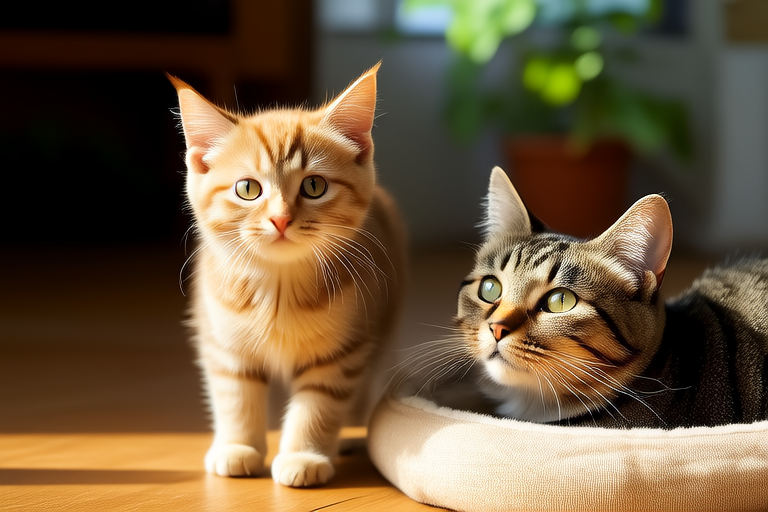Adorable Munchkins: The World’s Most Unique Cats
Welcome to the enchanting world of Munchkin cats! These adorable felines have captured the hearts of many with their unique charm and distinctive features. In this article, we’ll explore the fascinating history, physical attributes, personalities, and care requirements of Munchkin cats. We’ll also delve into some common myths and provide tips for potential owners considering adopting one of these delightful creatures.
A Brief History of Munchkin Cats
The story of the Munchkin cat begins in 1983 when a Louisiana woman named Sandra Hochenedel found two pregnant cats under a pickup truck. Among the kittens born was a short-legged female that Sandra named Blackberry. She later gave birth to a litter of kittens, including a male named Toulouse. These two became the founding members of the Munchkin breed.
Despite initial skepticism from the cat fancy community, the Munchkin gained recognition from The International Cat Association (TICA) in 2003. Today, Munchkins are celebrated for their unique appearance and endearing personalities, making them one of the most sought-after breeds.
Physical Characteristics
One of the most striking features of Munchkin cats is their unusually short legs. This characteristic is due to a naturally occurring genetic mutation, which results in a condition known as hyposthesis. However, despite their shorter legs, Munchkins are surprisingly agile and can leap to impressive heights.
Munchkins come in a variety of coat colors and patterns, with longhair and shorthair varieties. Their coats are soft and silky, and they often have large, expressive eyes that add to their charm. While their legs may be shorter, their bodies are proportionate, giving them a sleek and graceful appearance.
Personality and Adaptability
Munchkin cats are known for their friendly and affectionate nature. They are often described as being dog-like in their loyalty and attachment to their human companions. Many owners report that their Munchkins follow them around the house, seeking attention and companionship.
These cats are highly adaptable, making them suitable for a wide range of living environments. Whether you live in a small apartment or a spacious home, a Munchkin will likely thrive. Their playful and curious nature makes them excellent indoor companions, but they can also enjoy outdoor time if provided with a safe enclosure.
Real-life anecdote: Sarah, a Munchkin owner, shares, “My Munchkin, Whiskers, is always by my side. He loves to play fetch and will bring his favorite toy to me whenever he wants to play. He’s such a loving and loyal companion.”
Common Health Issues
While Munchkins are generally healthy, there are a few health concerns associated with their unique physique. One of the most significant issues is spinal problems, which can arise due to the curvature of their spine caused by their short legs. Regular veterinary check-ups and a healthy diet can help manage these conditions.
Another common issue is obesity, which can lead to joint problems and other health complications. It’s important to maintain a balanced diet and provide regular exercise opportunities for your Munchkin to keep them healthy and happy.
Popular Myths About Munchkin Cats
There are several misconceptions about Munchkin cats that need to be addressed. One of the most prevalent myths is that their short legs cause them pain or discomfort. While it’s true that some Munchkins may experience spinal issues, proper care and regular vet visits can help prevent these problems.
Another myth is that Munchkins are less active than other cats. In reality, Munchkins are just as playful and energetic as any other cat breed. Their short legs don’t hinder their ability to jump, climb, or chase toys.
Tips for Potential Owners
If you’re considering adopting a Munchkin cat, here are some tips to help you prepare:
- Research thoroughly: Learn as much as you can about the breed, including their specific needs and potential health issues.
- Choose a reputable breeder: Ensure the breeder provides health clearances and follows ethical breeding practices.
- Prepare your home: Create a safe environment for your Munchkin, especially if you have young children or other pets.
- Provide regular exercise: Encourage playtime and interactive activities to keep your Munchkin physically and mentally stimulated.
- Schedule routine vet visits: Regular check-ups can help catch and address any health issues early.
By following these tips, you can ensure that your Munchkin cat leads a happy and healthy life.
Conclusion
Munchkin cats are truly one-of-a-kind. With their unique physical features, friendly personalities, and adaptability, they make wonderful companions for many households. By understanding their specific needs and providing proper care, you can enjoy the company of this charming breed for years to come.
Whether you’re a seasoned cat owner or new to the world of feline companionship, a Munchkin could be the perfect addition to your family. Their endearing qualities and loving nature are sure to melt even the coldest of hearts.
